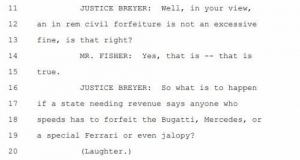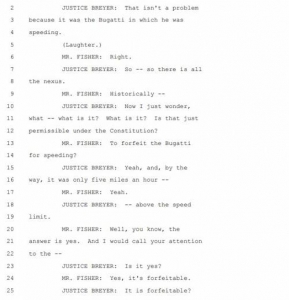Supreme Court Argues for Protecting Citizens from Unlimited Civil Forfeiture

DUI Defense Attorney Frank Lannom
The Government wants to seize your automobile for speeding five miles over the limit, but Supreme Court Justice Breyer doesn’t agree and leads Government attorney into a trap that proves they have no respect for the 8th Amendment of the U.S. Constitution.
Asset forfeiture is now an entrenched part of law enforcement. Many agency budgets are now dependent on money seized from citizens. The forfeitures don’t require criminal convictions or even criminal charges. Citizens are not given jury trials and must pay money before being permitted to even ask why the government has taken their property. I recently defended a seizure from two senior citizens whose son used their property to commit a crime. The State did not accuse them of knowing the crime was being committed, but still seized their property. We obtained the property back, but only after tens of thousands were spent in a three-day administrative trial. The Supreme Court of the United States is now taking some swings at this abuse.
The Supreme Court heard oral arguments in a case concerning “civil in rem forfeiture”. In other words, the State was arguing the constitutional prohibition against an excessive fine did not apply acts where the property seized was involved in a crime. Supreme Court Justice Stephen Breyer used only about 100 words to twist Indiana’s attorney general into admitting that his state could seize citizen’s cars over something as insubstantial as speeding 5 miles-per-hour over the limit.
Tyson Timbs, the plaintiff in the case before the Supreme Court, was arrested in 2015 after selling heroin to undercover police officers. He pleaded guilty to one count of dealing a controlled substance and one count of conspiracy to commit theft, and he was sentenced to one year of house arrest followed by five years of probation. The state of Indiana seized his 2012 Land Rover—which he had purchased with money received from his late father’s life insurance payout, not with the proceeds of drug sales—on the ground that it had been used to commit a crime. Timbs’ attorneys are arguing that the seizure of the Land Rover is an unconstitutional violation of the Eighth Amendment’s ban on excessive fines and fees.
“The Excessive Fines Clause is a critical check on the government’s power to punish people and take their property,” is how Wesley Hottot, an attorney with the Institute for Justice, which is representing Timbs, describes the case. “Without it, state and local law enforcement could confiscate everything a person owns based on a minor crime or—using civil forfeiture—no crime at all.”
Indeed, that’s one of the issues that came up during Wednesday’s oral arguments. Justice Stephen Breyer stepped up to deliver the coup de grace to the government’s argument that unlimited asset forfeiture is constitutional.
Here’s how he set the trap:
Justice Breyer shows that money hungry governments have zero limitations in their quest for citizens’ property, that no limits exist to their greed, and the position of the States are fleshed out to what they really want, unlimited power to take any citizen’s property for any level of offense. In Tennessee, speeding is a class C misdemeanor while an out of date license tag or possession of a THC gummy bear is a class ted power to take citizens property without limitation for any level of offense from possession of a joint or a THC brownie.
The proposition is simple, a crime is crime. There are thousands of crimes listed in the state of Tennessee. There are so many just regarding driving that it’s impossible to follow every one. In Tennessee, speeding is a class C misdemeanor while an out of date license tag or possession of a THC gummy bear is a class A misdemeanor. If the State’s power is unchecked and no limitations are applied, the State can take ANY property away from a citizen, from homes, automobiles, $300,000 boats, or grandpa’s farm that was inherited, just because a single marijuana plant was grown. Standard government spending and taking, give an inch and they will take everything.
I have personally watched the abuses in civil forfeiture. State prosecutors, drug prosecution agencies are given free reign on capitol hill in Tennessee. Their lobbying is given the highest attention because they are viewed as the ones protecting us. But really, given what they admit they are after, who is protecting who?
In Defense of the Citizen Accused,


